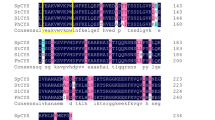Abstract
Different parasites cause severe lose in quantity and quality of crops. Many parasites develop haustorial cells and stylets that penetrate the host using secreted enzymes and mechanical pressure. Cysteine proteases are pre-pro-enzyme produced by parasites that are essential for normal parasitism. Papain is also a kind of cysteine proteases such that its propeptide segment has inhibitory properties and limits the protease activity of papain. To investigate the inhibitory effects of papain propeptide on some parasite proteases, we cloned inhibitory propeptide of papain of Ipomoea batatas, and enzymatic fragments of Diabrotica virgifera cathepsin L-like protease-1, Meloidogyne incognita cathepsin L-like protease 1, Heterodera glycines cysteine protease-1, Cuscuta chinesis cysteine protease and Orobanche cernua cysteine protease. After purification of recombinant inhibitory propeptide and enzymatic fragments, the inhibition activity of propeptide on cysteine proteases was measured. Finally inhibitory propeptide was transformed into tomato and transgenic plants resistance to parasites (bioassay) were examined. We demonstrated papain-propeptide inhibits cysteine protease of mentioned parasites. In transgenic tomato plants, papain-inhibitory propeptide effectively interrupted haustoria development. Haustoria-digitate cells of dodder could not differentiate and develop into the phloem and xylem hyphae on transgenic tomatoes. Parasites grown on transgenic tomatoes showed reduction in vigor and productivity due to defective connection of haustoria. Lower ratio of female nematodes and a decrease of nematode egg mass per transgenic line indicated biocontrol of nematode. The changes in growth factors of parasite challenged transgenic lines relative to controls, indicates the efficacy of papain propeptide in control of parasitism.








Similar content being viewed by others
References
Albert M, Kaiser B, van der Krol S, Kaldenhoff R (2010) Calcium signaling during the plant-plant interaction of parasitic Cuscuta reflexa with its hosts. Plant Signal Behav 59:1144–1146
Amini M, Saify Nabiabad H, Deljou A (2017) Host-synthesized cysteine protease-specific inhibitor disrupts Cuscuta campestris parasitism in tomato. Plant Biotechnol Rep 11:289–298
Amini M, Saify Nabiabad H, Deljou A (2018) The role of cuscutain-propeptide inhibitor in haustoria parasitism and enhanced resistance to dodder in transgenic alfalfa expressing this propeptide. Plant Biotechnol Rep 58:144–146
Ashigh J, Marquez E (2010) Dodder (Cuscuta spp.) biology and management. NM State University, Guide A-615. vol 54. pp 31–34
Birschwilks M, Sauer N, Scheel D, Neumann S (2007) Arabidopsis thaliana is a susceptible host plant for the holoparasite Cuscuta spec. Planta 226:1231–1241
Bleischwitz M, Albert M, Fuchsbauer HL, Kaldenhoff R (2010) Significance of cuscutain, a cysteine protease from Cuscuta reflexa, in host-parasite interactions. PMC Plant Biol 10:227
Borsics T, Lados M (2002) Dodder infection induces the expression of a pathogenesis-related gene of the family PR-10 in alfalfa. J Exp Bot 53:1831–1832
Dennis C (2013) Alfalfa management guide for Ningxia. United Nations Food and Agriculture Organization, pp 1–2. Retrieved 3 August 2013
Dinh PTY, Zhang L, Brown CR, Elling AA (2014) Plant- mediated RNA interference of effector gene Mc16D10L confers resistance against Meloidogyne chitwoodi in diverse genetic backgrounds of potato and reduces pathogenicity of nematode offspring. Nematology 16:669–682. https://doi.org/10.1163/15685411-00002796
Ejeta G, Butler LG, Hess DE, Vogler RK (1991) Genetic and breeding strategies for Striga resistance in sorghum. In: Ransom JK, Musselman LJ, Worsham AD, Parker C (eds) Proceedings of the 5th international symposium of parasitic weeds, CIMMYT, Nairobi, Kenya, 1991, pp 539–544
Furuhashi T, Furuhashi K, Weckwerth W (2011) The parasitic mechanism of the holostemparasitic plant Cuscuta. J Plant Interact 6:207–219
Kim SH, Hamada T (2005) Rapid and reliable method of extracting DNA and RNA from sweetpotato, Ipomoea batatas (L). Lam. Biotechnol Lett 27:1841–1845
Marra B, Souza D, Aguiar J, Firmino A et al (2009) Protective effects of a cysteine proteinase propeptide expressed in transgenic soybean roots. Peptides 30:825–831
Mishra JS (2009) Biology and management of Cuscuta species. Indian J Weed Sci 41:1–11
Okamoto T, Shimada T, Hara-Nishimura I, Nishimura M, Minamikawa T (2003) C-terminal KDEL sequence of a KDEL-tailed cysteine-proteinase (sulfhydryl-endopeptidase) is involved in formation of KDEL vesicle in efficient vacuolar transport of sulfhydryl-endopeptidase. Plant Physiol 132:1892–1900
Papolu PK, Gantasala NP, Kamaraju D, Banakar P, Sreevathsa R, Rao U (2013) Utility of host delivered RNAi of two FMRF amide like peptides, flp-14 and flp-18, for the management of root-knot nematode, Meloidogyne incognita. PLoS ONE 8:e80603. https://doi.org/10.1371/journal.pone.0080603
Saify Nabiabad H, Yaghoobi M, Jalali-Javaran M, Hosseinkhani S (2011) Expression analysis and purification of human recombinant tissue type plasminogen activator (rtPA) from transgenic tobacco plants. Prep Biochem Biotechnol 41:175–186
Sajid M, McKerrow JH (2002) Cysteine proteases of parasitic organisms. Mol Biochem Parasitol 120:1–21
Santamaria M, Arnaiz A, Mendoza M, Martinez M, Diaz I (2015) Inhibitory properties of cysteine protease pro-peptides from barley confer resistance to spider mite feeding. PLoS ONE 10(6):e0128323
Saric-Krsmanovic M, Bozic D, Malidza G, Radivojevic L et al (2015) Chemical control of field dodder in alfalfa. Pestic Phytomedicine 30:107–114
Vaughn KC (2002) Attachment of the parasitic weed dodder to the host. Protoplasma 219:227–237
Wilhite E, Elden TC, Brzin J, Smigocki AC (2000) Inhibition of cysteine and aspartyl proteinases in the alfalfa weevil mid gut with biochemical and plant-derived proteinase inhibitors. Insect Biochem Mol Biol 30:1181–1188
Yoder JI, Scholes JD (2010) Host plant resistance to parasitic weeds; recent progress and bottlenecks. Curr Opin Plant Biol 13:478–484
Acknowledgements
The research is partially supported by the Bu Ali Sina University.
Author information
Authors and Affiliations
Corresponding author
Ethics declarations
Conflict of interest
The authors declare that they have no conflict of interest.
Additional information
Publisher's Note
Springer Nature remains neutral with regard to jurisdictional claims in published maps and institutional affiliations.
Electronic supplementary material
Below is the link to the electronic supplementary material.
Rights and permissions
About this article
Cite this article
Saify Nabiabad, H., Amini, M. & Kianersi, F. Ipomoea batatas: papain propeptide inhibits cysteine protease in main plant parasites and enhances resistance of transgenic tomato to parasites. Physiol Mol Biol Plants 25, 933–943 (2019). https://doi.org/10.1007/s12298-019-00675-3
Received:
Revised:
Accepted:
Published:
Issue Date:
DOI: https://doi.org/10.1007/s12298-019-00675-3




